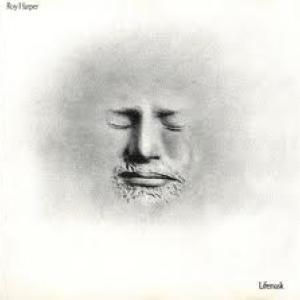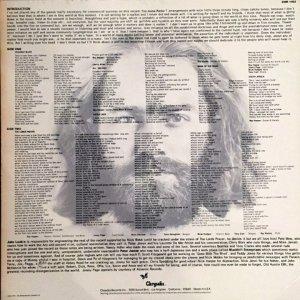Lifemask
by Harper, Roy


Artist:
Roy Harper
Label:
Chrysalis
Catalog#:
CHR 1162
Format:
Vinyl
Country:
US
Released:
1973
| Tracklist | |||
| A1 | Highway Blues | ||
| Notes: |
Roy Harper - Bass, Synthesizer |
||
| A2 | All Ireland | ||
| Notes: |
Roy Harper - Harmonica, Bells |
||
| A3 | Little Lady | ||
| A4 | Bank Of The Dead | ||
| Notes: |
Brian Hodges - Bass |
||
| A5 | South Africa | ||
| B | The Lord's Prayer | ||
| Notes: |
Brian Hodges - Bass |
||
Credits
Roy Harper - Guitar, Vocals
Peter Jenner - Producer
Notes
B is one track but is further subdivided as:
a) Poem
b) Modal Song Parts I to IV
c) Front Song
d) Middle Song
e) End Song (Front Song Reprise)
Strawberry Bricks Entry:
Roy Harper's life story up until this time could fill pages. He started his career during the skiffle boom of England's late 50s; and by the mid-60s, his busking had landed him a regular slot at the influential Les Cousins folk club. His first album was released in late 1966, and a couple of other albums followed for various labels, all produced by Shel Talmy. Equally notable was the track dedicated to him on Led Zeppelin's III, "Hats Off (To Roy Harper)." By 1970, however, Harper had signed with Peter Jenner and EMI's Harvest label, releasing the excellent Flat, Baroque And Berserk, and began a creative peak with his next several albums. Ostensibly a soundtrack for the movie Made (in which Harper also starred), Lifemask was released in February 1973. The first side features a selection of Harper's songs, from the rocking "Highway Blues" to the tuneful "Bank of the Dead" to the closing ode to the anti-apartheid movement, "South Africa." All accentuate Harper's songwriting talent; it's somewhere near folk in nature, yet too dark, too poetic and, ultimately, very progressive. The second side encompasses the epic "The Lord's Prayer"—"spontaneous interpretations of how we are interacting with the planet." Harper's poetry opens the piece, his spoken words manipulated by tape, before yielding to his acoustic guitar. As the song traverses the side, he adds a little synthesizer, and among others, Jimmy Page's lead guitar and Brian Davison's drumming; they shift from section to section, reprising the main theme. There's something seductive here in Harper's craft, particularly in the combination of his layered guitar and transcendent vocal. His next release, Valentine, featured shorter tracks than on his previous albums, and managed to enter the UK charts at No. 27. Following a live album, Harper transitioned to rock music for HQ and Bullinamingvase, released in 1975 and 1977, respectively; both also entered the UK charts. By the end of the decade though, his contract with Harvest had come to an end, yet his career was still in full bloom.

